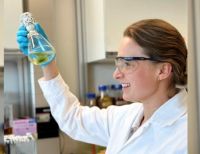Michael Kreuzer, with his white hair and white beard, speaks with an endearing Bavarian accent. He seems relaxed on this hot summer afternoon just a few weeks before his retirement. As he begins to talk, his eyes light up.
A shaky start in Zurich
It all began in 1994 when he moved from University of Göttingen to ETH Zurich as a young professor of animal nutrition. Michael Kreuzer had already given notice on his house and packed up the moving boxes designed to be moved to Switzerland when he received a fax from his future colleagues indicating that his new post as an ETH professor had been in jeopardy. Everyone in Zurich was worried that the ETH Board would not confirm Kreuzer’s appointment after all.
“Of course, I had no idea what was going on,” Kreuzer recalls. When it became clear that the hold-up was simply a dispute between the supervisory body and the president of ETH, Kreuzer was relieved. “Then things moved forward with my appointment as planned,” he says.
Soon enough, what started out as a nail-biter blossomed into a fruitful partnership for all parties. Kreuzer has been teaching and researching at ETH Zurich in the field of sustainable feeding of livestock, in particular ruminants, pigs and poultry, for 27 years.
The facilities of the research platform AgroVet-Strickhof, which includes a high-altitude site at Alp Weissenstein just below the Albula Pass, are his refuge. This partnership in the field of livestock research between ETH, the University of Zurich and the canton of Zurich was launched in 2017 after more than ten years of planning. Kreuzer was one of its visionaries and was closely involved in the project. The heart of the project is the Metabolic Centre, where research is conducted on the digestion and energy utilisation of livestock.
More climate-friendly cattle
Kreuzer was one of the first scientists to seriously explore the question of how to reduce the emission of the climate-damaging methane from ruminants. Bacteria break down plant fibre in the rumen of cattle, sheep and goats. “A by-product of this is hydrogen, which the animal has to dispose of,” he explains. Primordial methanogenic microbes do this by producing methane from hydrogen and carbon dioxide, which the ruminant then expels through its mouth.
“The aim is to inhibit methane formation without inhibiting digestion of the fibre,” says Kreuzer. He pretty much knows every trick in the book in this respect. His first experiment at ETH was a big moment when he discovered that coconut oil can reduce methane by up to 70 percent. “That was a huge deal at the time,” he chuckles. However, since coconut fat is sourced from the tropics, it is not practical for cows in Switzerland.
















